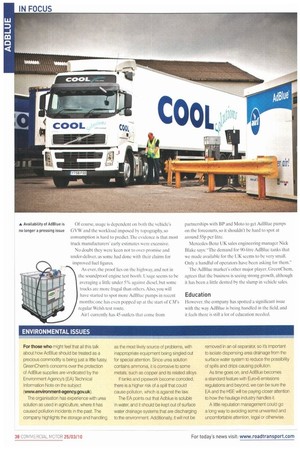ENVIRONMENTAL ISSUES For those who might feel that all this
Page 38

If you've noticed an error in this article please click here to report it so we can fix it.
talk about how AdBlue should be treated as a precious commodity is being just a little fussy, GreenChem's concerns over the protection of AdBlue supplies are vindicated by the Environment Agency's (EA) Technical Information Note on the subject (www.environment-agency.gov.uk).
The organisation has experience with urea solution as used in agriculture, where it has caused pollution incidents in the past. The company highlights the storage and handling
as the most likely source of problems, with inappropriate equipment being singled out for special attention. Since urea solution contains ammonia, it is corrosive to some metals, such as copper and its related alloys.
If tanks and pipework become corroded, there is a higher risk of a spill that could cause pollution, which is against the law.
The EA points out that Adblue is soluble in water, and it should be kept out of surface water drainage systems that are discharging to the environment. Additionally, it will not be removed in an oil separator, so it's important to isolate dispensing area drainage from the surface water system to reduce the possibility of spills and drips causing pollution.
As time goes on, and AdBlue becomes a standard feature with Euro-6 emissions regulations and beyond, we can be sure the EA and the HSE will be paying closer attention to how the haulage industry handles it.
A little reputation management could go a long way to avoiding some unwanted and uncomfortable attention, legal or otherwise.




































































































































